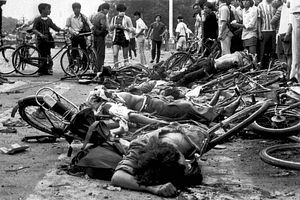It has been 29 years since tanks rolled into Tiananmen Square from both east and west in Beijing, killing hundreds along the way, and irrevocably changing the history of modern China.
In early 1990, a few months after the massacre and not long after a six-month period of martial law and curfews had just been lifted in Beijing, a Chinese Red Cross official told this correspondent that her organization’s official tally of the dead was 2,312. I was on a domestic flight in China, the only foreigner, as was often the case at that time. I do not know the woman’s name, nor did she want me to. She saw me sitting in a row just in front of her and created an opportunity to speak to me. She was nervous and afraid. She had every right to be. People had been disappearing in Beijing for months just for talking to foreigners.
We know now that there were calculations made by leadership in China before they brought the military in to clear the Square. How would the world react? How big would the impact be on the fledgling business environment that China was creating to attract foreign investment? Would the action spark uncontrollable domestic revolt? The chilling verdict of the calculations of these men is that they were mostly right.
First, the Chinese correctly guessed that everyday Chinese would be far less focused on political and murderous misdeeds by the Chinese Communist Party and the People’s Liberation Army as long as their standard of living was being improved. In this they were absolutely right. This is no criticism of the Chinese people. In 1989 poverty gripped the country, from top to bottom, and in the countryside, where most people still lived, bare subsistence living was the norm. Any relief was welcome.
Second, the events that took place between China and the rest of the world in the weeks and months following the massacre highlighted a general hypocrisy on all sides and among all parties that resonates until today. Representatives of the leadership of most Western industrialized countries began quietly returning to China to test the political and business waters while Beijing was still under martial law. Diplomats, executives, and their families who had been evacuated from Beijing had barely gotten over jet lag before key personnel were called back to attempt to continue business as usual. The Chinese leadership had counted on this.
Third, the Chinese Communist Party gambled that they could control the narrative domestically, and they were right. Casting the protesters in their later days as tools of foreign intervention meant to harm China, the leadership was able to admit the event while casting it in patriotic terms: a necessary evil to save the country.
But there is unfinished business in Tiananmen Square. It is an unclosed chapter of China’s march toward modernity. To the majority of Chinese who did not witness it or who were not yet born when it occurred, it is an undisclosed and whispered legend of indeterminate importance. To many of those who know the magnitude of what happened, not just in numbers dead, but in dreams shattered, it underscores the illegitimacy of the leadership that brought the tanks in.
To almost all Chinese at the time, and perhaps forever, Tiananmen broke their hearts, and not just for the obvious reason of hundreds or thousands dead. The killings were carried out by the one institution in New China in which most everyday Chinese still believed and trusted: the People’s Liberation Army. This was a harder truth than any other to accept.
But the real and lasting legacy of Tiananmen Square is that, by not meaningfully confronting the Chinese government with palpable, long-term consequences for the murder of their unarmed citizens, extreme censorship and political repression have become institutionalized in China. Today, those tools underpin the foundation of the state.
For those who were able, from personal experience, to measure the mood of China both before and after Tiananmen Square, a lasting bitterness, fueled by a sense of betrayal, seemed to overcome the entire nation. China in 1989 was on the cusp of something more than just an economic explosion, one which few foresaw the magnitude of, but all quietly hoped for. There was a tentative sense that the torments of the Cultural Revolution were finally assuaged. There was a palpable feeling that China was, truly, opening. Small but important forays into the private business were dotted across the city. Discussions could touch on ideas beyond Marx.
China hit a brick wall on June 4, 1989. When it recovered, neither leadership nor citizens ever headed in the same direction again. People found salvation in money; the Party found redemption in the pure act of maintaining power. The two have never truly reconciled, but they have found accommodation with one another, to serve mutual needs. One wonders when a sincere accounting, and a genuine reckoning, will ever come.

































